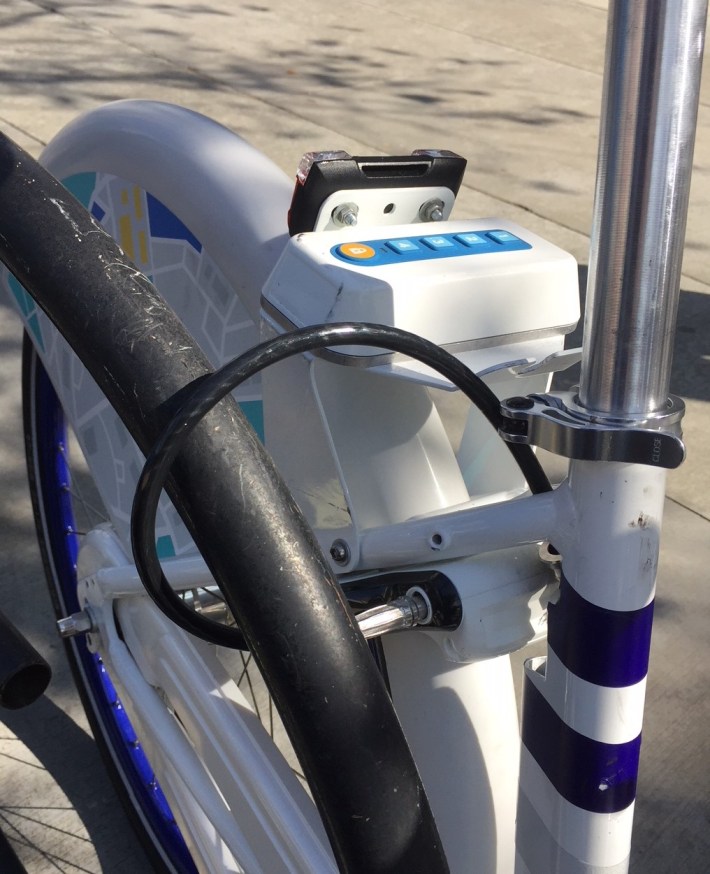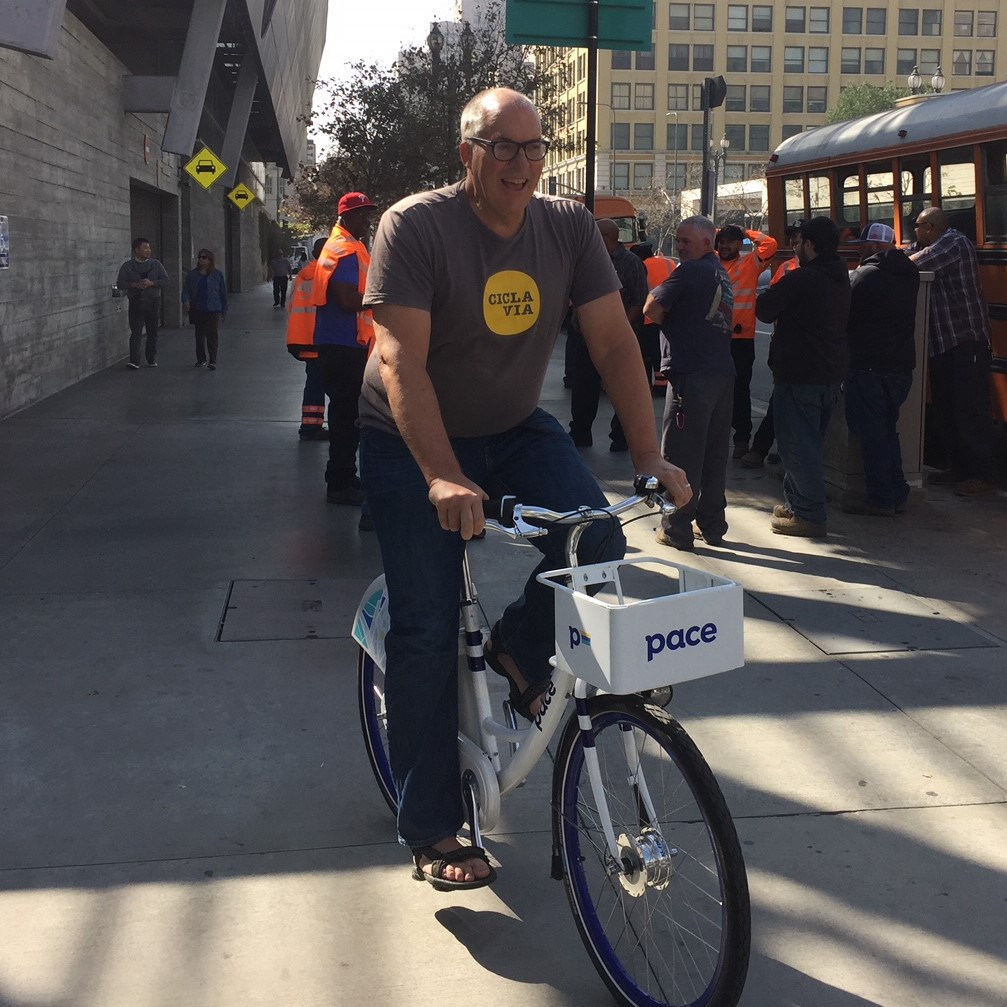Dockless bike share has been expanding in China and in many cities in the United States. "DoBi" first appeared in Los Angeles in late 2017. Today, three dockless companies are operating in different parts of L.A. City. There are also two docked bike-share systems. While some have criticized dockless systems for cluttering sidewalks, they can also be a relatively low cost transportation option for many Angelenos.
The city of Los Angeles is currently working to establish parameters for dockless bike-share operations within city borders, with proposed rules and regulations expected to be heard at the city council's Transportation Committee this month.
Readers may have thought that five flavors of bike-share might be enough in L.A., but there is yet another company poised to enter the market. Last week, Streetsblog L.A. caught up with a representative from Zagster - which already operates some smaller scale private bike-share systems in Southern California. Zagster recently introduced their Pace dockless bike-share, which is already active in a few U.S. cities. SBLA talked with Tim Alborg, the Director of Public Policy and Government Relations for Zagster.
SBLA: I know there are buildings in L.A. that have Zagster bikes, but let SBLA readers know a bit about the company and what it has done.
Tim Alborg: We’re a U.S.-based company, headquartered out of Cambridge, Massachusetts. We have about a hundred employees. The company started back in 2007. It's been around for more than ten years.
We have over 200 bike-shares across the country, in over 35 states. We have a really great national presence. About half that 200 are in cities and universities.
Here in the L.A. metro area, we have nearly forty Zagster bike-shares. Those are at commercial buildings and residential apartment buildings and what have you. We have over 400 bikes actually on the ground in the L.A. metro area, including Orange County.
We also have a great team of mechanics that works to keep our bikes working in good condition.
Describe the model on those bikes. Do they have a dock? A lock?
The Zagster bikes in L.A. are the first iteration of smart-bike tech we pioneered, with locks on bikes resulting in less expensive hardware and more flexible service.
These bikes can be locked mid-trip. If a resident at an apartment building grabs a Zagster bike to go to the store - to go shopping for a couple groceries - throw ‘em in the basket and come back - they can actually hold the bike at that grocery store.
Tell our readers a bit about how Zagster has entered the dockless bike-share business.
Zagster has an exciting new brand called Pace.
We like to think of it as “smarter dockless” - dockless without the drawbacks.
We announced this new Pace brand at the end of last year. We’re in a couple cities already: Tallahassee and Knoxville, and we’ll be launching in a number of other cities in the next few months.

The key differentiator is that our Pace bikes have two locks. These bikes have a traditional dockless rear lock to immobilize the rear wheel, but they also have a secondary lock so that the bikes can be locked to any public bike rack.
In Dallas, Washington D.C., and some other cities, there have been some challenges with dockless bikes that are accidentally tipped over, or maybe picked up and moved. Some of them have even found their way into waterways and lakes.
We’re really excited about Pace because it offers cities and residents a way to have dockless bike-share as a transportation option - in a way where you’re not creating urban clutter and blight. You’re ensuring that the public right of ways are clear for pedestrians and people with disabilities.
At the end of the day, bikes shouldn’t be competing with pedestrians. Shared bikes should be competing with single-occupancy vehicles.
We’re really excited about Pace bikes' ability to lock to things. We think this is the way the industry is going.
How do you expect Pace or Zagster bikes might be used by Angelenos? Who would use them?
There’s a lot of people stuck in L.A. traffic that want to get out - want to break free of the L.A. traffic and want to have a reliable bike-sharing solution. Maybe if you’re driving all the way across town, bike-sharing is not going to be the right fit. But if you’re going to your neighborhood store, or if you’re going a couple of miles to see a friend, or you're trying to a transit stop, then bike-sharing can be an option.
We think that the Pace model of dockless bike-sharing is going to be the one that’s sustainable here in L.A. The existing dock-based program is limited, and Pace can fill the gaps.
We’re really excited for people to one day be able to check it out themselves.
Does Pace or Zagster have anything coming up - that you’re at liberty to talk about - in the state of California?
Nothing I’m at liberty to talk about, but I will say that we’re operating our Zagster bike-shares in places throughout the state. And we’re definitely in conversations with a lot of city governments about Pace and how this can be another great transportation option.
Some folks are critical of bikes-share for not serving low-income and disabled folks. Talk about what Zagster and Pace do to address this.
One thing we’re also really excited about - and we think bike-sharing companies could be working on this more as an industry - is providing more options to those who traditionally haven’t been served - those who’ve traditionally been disadvantaged - when it comes to bike-sharing solutions.
We’re really proud to lead the industry when it comes to accessible bike solutions - bikes for the disability community. We have a number of bikes that we’re able to offer to those with disabilities.
We’re having that conversation with cities - letting them know that there are solutions for bike-sharing for people with disabilities, also for people who are in low-income neighborhoods or neighborhoods that haven’t traditionally been able to access docked bike-share. For dockless bikes with no stations, there's no guarantee of coverage in those underserved areas. Bikes will more likely end up clustered in affluent, already well-served neighborhoods.






